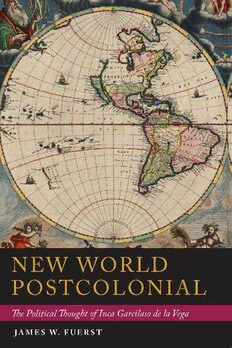
New World Postcolonial: The Political Thought of Inca Garcilaso de la Vega PDF
Preview New World Postcolonial: The Political Thought of Inca Garcilaso de la Vega
NEW WORLD POSTCOLONIAL ILLUMINATIONS: Cultural Formations of the Americas Series JOHN BEVERLEY AND SARA CASTRO-KLARÉN, EDITORS NEW WORLD POSTCOLONIAL The Political Thought of Inca Garcilaso de la Vega JAMES W. FUERST University of Pittsburgh Press To a scattered dynasty of solitaries Published by the University of Pittsburgh Press, Pittsburgh, Pa., 15260 Copyright © 2018, University of Pittsburgh Press All rights reserved Manufactured in the United States of America Printed on acid-free paper 10 9 8 7 6 5 4 3 2 1 Cataloging-in-Publication data is available from the Library of Congress ISBN 13: 978-0-8229-6540-4 Cover art: Nieuwe en “meest nauwkeurige” wereldkaart door Joan Blaeu (New and “most accurate” world map, by J. Blaeu) 1664, via Wikimedia Commons. Cover design by Jordan Wannemacher CONTENTS Acknowledgments vii Foreword by Sara Castro-Klarén ix INTRODUCTION 1 1. BECOMING AN INCA: LIFE, WORKS, AND CONTEXT 11 2. MESTIZO RHETORIC 40 3. THE MANY FACES OF VIRACOCHA AND THE TURNING OF THE WORLD: TRAGEDY, CONVERSION, REBIRTH 81 4. AUCA: TO KILL A TYRANT 118 5. “DIE A KING”: GONZALO PIZARRO’S REBELLION 148 vI | CONTENTS 6. JESUIT AMAUTAS: PREJUDICE, PREACHING, AND PEDAGOGY IN PERU 177 APPENDIX. “PROLOGUE TO THE INDIANS, MESTIZOS, AND CREOLES OF THE KINGDOMS AND PROVINCES OF THE GREAT AND MOST RICH EMPIRE OF PERU, EL YNCA GARCILASSO DE LA VEGA, YOUR BROTHER COMPATRIOT AND FELLOW COUNTRYMAN, HEALTH AND HAPPINESS” 214 Notes 225 Bibliography 287 Index 317 ACKNOWLEDGMENTS n preparing the earlier version of this text, I am deeply grateful for the I help and guidance of Richard Tuck, José Antonio Mazzotti, and Pratap Mehta, Doris Sommer for first introducing me to Inca Garcilaso, the faculty, students, and staff at the Centro Bartolomé de Las Casas in Cuzco where I studied for a summer and the Foreign Languages and Area Studies Grant from Harvard that enabled me to do so, Anthony Pagden and Jennifer Pitts for their comments on some of my initial research, Sankar Muthu for kindly securing me access to Bobst Library, and a Minority Dissertation Fellow- ship from the Ford Foundation that generously funded my writing. As for this version of the text, I owe a debt of gratitude to John Beverley and Sara Castro-Klarén for selecting it for the Illuminations series, to Alcira Dueñas, whose work on Andean intellectuals introduced me to Juan de Cuevas Herrera and who then helped me obtain a copy of his manuscript from the Biblioteca Real del Palacio de Madrid, and to the many Latin Americanists, Peruvian- ists, colonialists, postcolonialists, and garcilacistas who have offered invalu- able suggestions, encouragement, and support at various times over the years, including Sharonah Fredrick, Christian Fernández, Walter Mignolo, John Beverley, Margarita Zamora, José Antonio Mazzotti, Sara Castro-Klarén, and vIII | ACKNOWLEDGMENTS Rolena Adorno, among others. Finally, I would like to thank Josh Shanholtzer and Alex Wolfe at University of Pittsburgh Press, the anonymous reviewer whose insightful comments helped me to sharpen chapters 5 and 6, family and friends for putting up with me, and Ellen V. Holloman for her undying confidence that this work would one day make it into print. FOREWORD hus far the work of Inca Garcilaso de la Vega has not been chiefly T interpreted as an intervention in political thought. Drawing from the extensive bibliography on Inca Garcilaso in Spanish and the new and expand- ing bibliography in English, James Fuerst navigates a series of hidden and coded passages in the Royal Commentaries and its second part General History of Peru in order to bring together a significant number of texts and questions that enable him to sketch a map of Garcilaso’s political preoccupations as he narrates the history of the Inca dynasty and the government that is to come after the Spanish conquest of the Andean empire. Fuerst is not only attentive to Garcilaso’s overt and implicit discussions of Renaissance political theory, but he is particularly keen in locating and excavating any subterranean pres- ence, allusion, or vibration of Andean political concepts and practices that might illuminate Inca Garcilaso’s narration of political events and actions by the various personages that populate the thousands of pages of his narrative. Fuerst’s examination of the political thought of Inca Garcilaso is placed in the grid of current imperial studies, and to some extent it is written in the hope that imperial studies in English about the English invasion and set- tlement of North America find in this study a call to consider the questions
